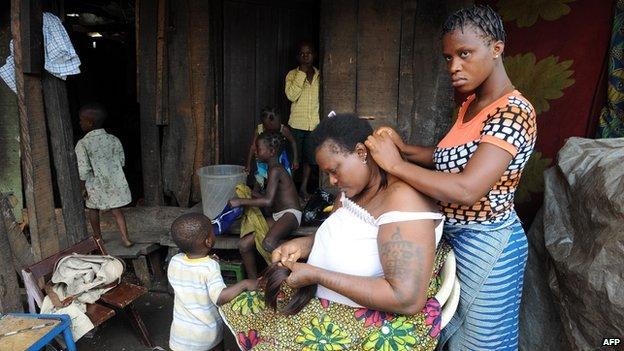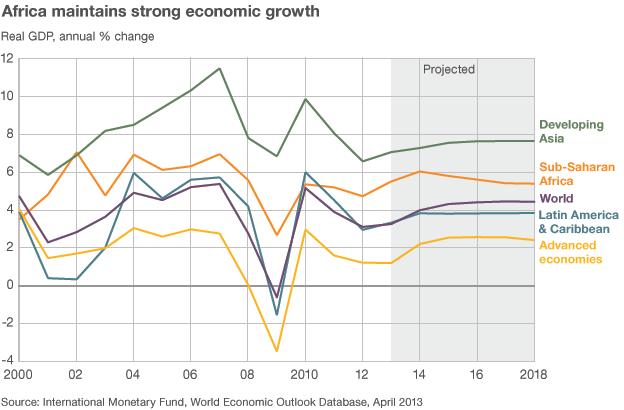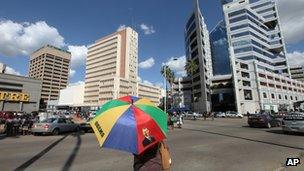Letter from Africa: Too early to celebrate growth figures
- Published
- comments

Despite recent growth, millions of Africans still live in shanty towns
In our series of letters from African journalists, London-based Ugandan writer Joel Kibazo considers whether the continent is resting too much on its laurels amid all the talk of Africa's rapid economic growth.
For much of my life sub-Sahara Africa was a byword for military coups, disasters, famines and a host of negative news stories about hopes and aspirations squandered.
So it has not only been a great relief but a joy to see the pendulum swing the other way as Afro-pessimism has turned into Afro-optimism over the last decade.
I should be jumping for joy with each new set of figures that is published extolling the continent's great leaps and successes.

But alas it is that constant flow of good news that has been worrying me of late.
Although each day brings new data showing rising income levels, a reduction in poverty, improved numbers of children in education and so forth, I have for some time had a fear that this new euphoria was crowding out what is still the reality for many if not most Africans.
I have discussed my unease with several people and even tried to raise the topic at several forums, but the general response has been to brush my concerns aside.
Instead I have been urged to join in the celebrations, after all, some say, we may never see the continent portrayed in such glowing terms again.
I was in the Moroccan city of Marrakech recently to attend the annual meeting of the African Development Bank (AfDB), the continent's biggest development financial institution.
'Diaspora returning'
As I settled down to listen to the opening ceremony speeches, I had no reason to believe I would be listening to anything but another roll-call of achievements.
But then AfDB President Donald Kaberuka took to the stage.
Having sat through many a speech, it is not often that one makes my head turn.
This was different. Here was someone speaking to the very concerns and fears I have had as he reviewed the state of the continent.
Of course, there was much to celebrate, including impressive growth figures that saw Africa's average annual income cross the $1,000 (£640) mark; life expectancy up from 40 to 60 years of age; more children in school than at any time in history; seven out of 10 Africans own a mobile and four-fifths of the continent's people live in countries where there is peace, stability and strong economic growth.
What is more - Africa's young talent in the diaspora is returning in large numbers.
But there is, to quote him directly, "a painful reality which demands our undivided attention".
He went on to mention that although the economies are growing, the rate of growth is still lower than needed, given that the population is also rising.
We have booming cities, skyscrapers, but also millions of destitute people eking out a living in teeming slums and shanty towns.
He also spoke of a growing middle class yet peasants are still using hoes.
But even more sobering, he noted, was that 52 million children were out of primary and secondary school.
Reality checks do not come starker than this.
And I for one was heartened that a leader of one of the continent's biggest institutions was urging us to halt the celebration parties.
Much of Africa's recent growth has been powered by the extraction and sales of natural resources.

African cities have their fair share of skyscrapers
As we walked out of the closing ceremony, a Kenyan friend turned to me and said: "The way we have been boasting, you would think we are now Australia or Canada and yet these two giants just get on with it."
In 2010 alone, forests, minerals metals, and energy generated 11.5% of the country's gross domestic product, or 142.5bn Canadian dollars ($139.8bn, £89.7bn), and directly employed more than 700,000 people.
The figures from Australia are just as impressive.
While we must be proud and celebrate the recent gains and achievements in Africa, particularly as they have been a long time coming, it is too soon to dwell on these gains when there is still so much to do just to get the basics to our fellow citizens.
There is no doubt this is Africa's hour and there is no turning back, but it would be good if the party invitation could be extended to all citizens.
If you would like to comment on Joel Kibazo's latest column, please use the form below.
- Published18 June 2013